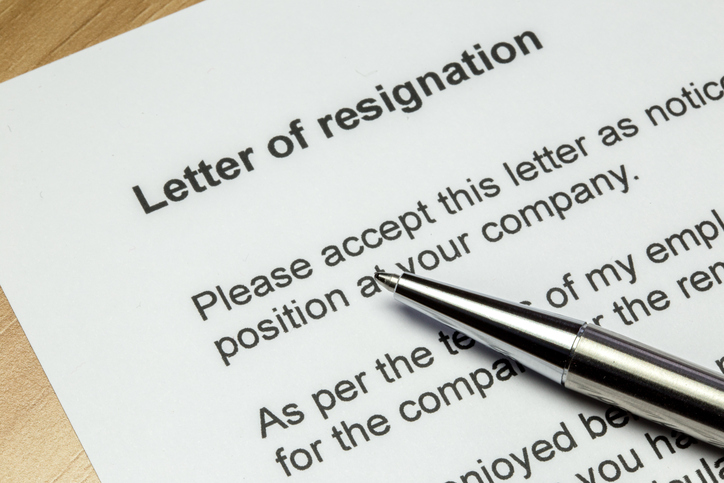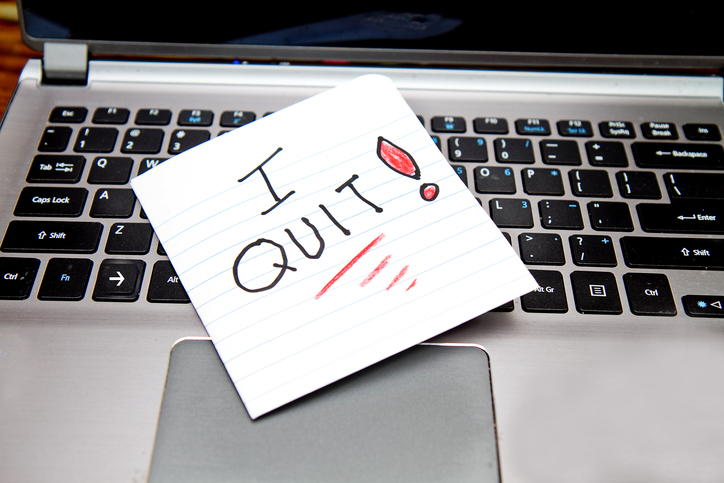
Congratulations! You are now reading the most comprehensive guide on the planet on How to Quit a Job. We hope you ll find this guide useful. Our goal is to help you leave a job gracefully. If you find this resource on quitting a job useful, please share it and tell a friend!
This guide was written before The Great Resignation, but Jobacle knew the time would come for everyday workers to stand up for what they believe in and revolutionize the future of work.
How to Quit a Job: INTRO
Sayonara! Arivaderchi! Goodbye and good riddance!
Parting is such sweet sorrow. Or is it? Let s be honest, when it comes to leaving your place of employment, saying goodbye can be downright exhilarating.
Unlike waving to a loved one as you board a plane, when you leave a job, you are likely not thinking of reconnecting at a later date.
Your departure probably feels like the final step of the long and grueling process known as the job search. Combine the excitement of moving on with the illusion of the end and you ll start to understand why so many people fumble the ball right before the goal line during the last play of the game. The consequences might not be immediate, but that doesn t mean they won t be severe.
Leaving a job is an art form - one that most people will never perfect. Why? Because it s something we only do a handful of times in our lives. Practice is not an option. That is why it is imperative to get it right.
In a world where there are already too many career advice books, we couldn t help but notice that 99% of them are about landing a job, not leaving one. A graceful exit sets you up for your next job, therefore making it the first true step of the job search.
This guide is written to protect YOU, the everyday hard-working individual who seeks a fair paycheck and rewarding work. At times this guide might appear to expect the worst from the employer we are leaving behind. This is often the exception, not the rule. However, in order to best protect yourself, we believe this mindset is a necessary evil. With that being said, let s get packing, it s time to leave your job…the right way! Every end is a new beginning, so let s get started.
How to Write a Letter of Resignation
Exiting a job conjures up different emotions for different people. For some, it s vindication; a chance to show your boss that you re no longer shackled to your desk. That you re worth something. Desired.
For others, leaving a post is as nerve-wracking as jumping from a plane without a parachute.
One of the tools in your arsenal to help eliminate emotion overload and keep you on-point is a resignation letter. Cut and dry in nature, this letter is designed as a courtesy to the employer, delivering transition information while giving you one final opportunity to display your professionalism.

You should always resign from a post in-person to your direct supervisor. Handing in an official resignation letter has several important functions:
A Resignation Letter Provides PROOF. Here s the story of Mike, a hard-working cubicle dweller at BS Corp. for the past six years. After accepting an amazing job offer from the competition, Mike sat down with his direct supervisor and verbally delivered the news of his imminent departure.
For the next 10 days, Mike quietly toiled away, tying up all unfinished projects and performing his job dutifully until the end. In a chance encounter, Mike bumped into the head of HR in the hallway.
Hi Doug, Mike said. I was wondering if I ll have to do an Exit Interview.
The look on Doug s face said it all; Mike s pending exit was news to him.
Whether the supervisor s decision to keep Mike s two weeks notice from HR was born out of spite or forgetfulness is irrelevant. The bottom line is that there are no winners in this situation. The manager looks silly, the employee can be resented, and HR has to scramble to fill the job.
A written letter lets you hold on to something tangible.
It also allows you to follow up after the meeting. Even if you have physically handed the letter to your boss, be sure to send an electronic version immediately afterward. This will attach a date stamp to your actions.
Doug,
Just to follow up on our meeting several minutes ago, attached is my official letter of resignation.
Thanks,
Mike
There s no need to reiterate the points already in the letter. Short and sweet will get the job done.
A Resignation Letter Helps to ELIMINATES CONFUSION. A resignation letter should clearly indicate the exact date you will be severing your ties with the organization.
Please be advised that Monday, July 1, 2018, will be my final day here at BS Corp.
Confirming your date of separation will ensure that everybody can stay organized during this time of transition.
A Resignation Letter Keeps Things PROFESSIONAL. With the world texting in sick to work and increasingly communicating via electronics, a printed letter still adds a level of professional credibility to your actions. Despite the move to digital media, most of the world can still appreciate a physical letter; something they can hold on to.
A Resignation Letter Helps You Stay ORGANIZED. Be sure to file a copy of the letter in your personal files. Keep a hard copy and send it in an e-mail to an address you frequently use. This information will come in useful down the road when additional updates to your resume are necessary. While many employers will not verify all of the information on your CV, the most likely shred of data that they will validate are the dates of employment. This letter puts the important date at your fingertips.
Resignation Letter Samples
Simple & Basic
———————————————————————————————————————-
Dear Mr./Mrs. {Direct Supervisor s Last Name},
I hereby tender my resignation from {Company Name} as {Title}.
My last day will be on Monday, January 15, 2018, two weeks from today.
Sincerely,
Signature
Your Name
———————————————————————————————————————-
Positive & Personal
Dear {First Name of Direct Supervisor},
I have accepted an offer with another organization and have decided to tender my resignation. My last date of employment will be Monday, January 24, 2018.
This decision has nothing to do with the exceptional opportunity you have provided me with here. You and the company have been more than fair with me, and I genuinely appreciate all your support.
I want to thank you for all you have done for me here at {Organization Name}. It s been a pleasure working with you and for such a great company.
I wish the department and the company continued success. Please feel free to contact me at any time if I can be of further assistance in helping with a smooth transition.
Sincerely,
Signature
Your Name
———————————————————————————————————————-
Saying Goodbye to Coworkers
Now that you have handed in a typed resignation letter to your supervisor, it is time to let your colleagues and peers know that you are moving on up (or at least out!).
One popular tactic is to send out a mass e-mail to everyone you have come in contact with during your tenure. In this case, choosing a distribution list is a tricky battle. On one hand, you want to extend the courtesy of letting everybody know that you are leaving. On the other, there will be plenty of people who simply won t care.
It is for this reason we recommend delivering the news in person to as many people as possible. Shake hands, make eye contact and visit everyone you had business with before you depart. Individual, hand-written thank you cards are a nice touch for supervisors and/or people you truly learned from. No gifts, please.

You might think there aren t enough hours in the day, but remember - a graceful exit is an art form - one that can pay dividends down the road. From the security guard who mans the front desk to the intern who started five days ago, if you deal with the person on a regular basis, or has had a recent interaction, don t skip out on a proper goodbye.
You have a unique relationship with each person you deal with. And each deserves an individual goodbye.
Here are some examples of REAL goodbye letters I ve received over the years. File these under BAD MOVE.
We only part to meet again. - English poet John Gay
A PLAN FOR STAYING CALM
Quitting a job is one of the most stressful career transactions in existence. The company has invested time and money into your career, and no employer likes losing a worker…especially when it s on the worker s own accord. Your guilt goes into overdrive, and you expect the worst. Before putting in your notice, do everything in your power to stay calm, cool and collected.
DO IT EARLY
Like any oxygen-breathing human being, you likely avoid situations that spike your anxiety level. As you might already know, avoidance will only allow your stress to build when dealing with the inevitable. That is why, as difficult as it may seem, you should put in your two weeks notice as early as possible.
If you are set to leave work on the 20th, why not put your notice in on the first. Giving yourself a few days of wiggle room will help you stare down the crappy excuses (My boss is too busy. He/She looks like they re in a bad mood.) you give yourself to avoid having this conversation. Your natural instinct might question why you should give them an extra day of notice; they don t deserve it. But this is no longer about them, it s about you. And you owe it to yourself to make things as easy as possible.
You should also take care of this - and every stressful work situation - as early as possible. Our tension generally grows as the day moves forward. Taking care of business in the morning will help clear your mind for the rest of the day, rather than cloud it in a haze of worry and discomfort.
REHEARSE
We ve all seen the guy in the car talking to himself. He s not crazy. He might be on to something.
Practicing in your mind is useful, saying the words aloud are even better, and carrying out a mock conversation with someone you trust playing the role of your boss, is better yet. Take advantage of your muscle memory. Being prepared will give you more confidence and keep you in control of the resignation process.
Role-playing will allow you to be prepared for every possible angle, irrespective of its likelihood. An actor can help you identify factors or possibilities you have not considered.

DEEP BREATHING
Before you enter your boss office, I recommend calming your body down. Two of my favorite techniques are deep breathing and tense / release.
breathing
There are two options that I favor.
1) Deep circular breathing. Inhale through your nose for 3 seconds. Hold for 3 seconds. Exhale evenly for 3 seconds out of your nose.
2) Sitting up straight, breath as deeply as you can through your nose, filling your stomach with oxygen. Hold the air for as long as comfortable. This is usually between 4 and 10 seconds. Release the air through your mouth with some gusto.
tense / release
Designed to relax your muscles, this series of exercises can be practiced anywhere at any time, with little risk of looking like a fool.
You want to tighten each muscle group in the body, and then relax it suddenly. Start with your face and work down to your toes. Take a moment to acknowledge the difference between the tensing state and the releasing state. Once you can recognize what tension feels like in your body, you will be able to spot it and alleviate it.
Looking for more ways to relax before a stressful work situation? Check out 50 ways to reduce stress.
You and I will meet again when we re least expecting it. - Musician Tom Petty
GOING OUT FOR DRINKS
Born out of equal parts admiration and obligation, one common job-exit ritual involves having your (soon to be ex) coworkers take you out for an alcoholic beverage. The setup is that they would like to send you off in style, but this forced social encounter often has several underlying motives.
Alcohol and work don t mix, but you already knew that. We ll leave it to those HotMonsterBuilder sites to regurgitate tired tales of inebriated employees dancing on desks. Let s look at a few ulterior motives.
SLAM. This is where employees assemble to piss and moan about their employer. While never a good practice, it is at its worst when you are on your way out. Since you have in essence escaped, you need to tread lightly when criticizing the employer. Because either way, your fellow colleagues will resent you in the morning. After all, the employer you ve all been complaining about still signs their checks.
HELP. This is the hope that you will include your fellow employees in the jailbreak. Coworkers will either want to know if your new job is hiring (and it s obviously too awkward for you to recommend anyone; you haven t even started yet!). They also will want you to reveal the strategy you employed in getting out. Odds are there is no secret formula, leaving coworkers resentful that you can t help them escape.

GOSSIP. This is similar to SLAM, but the hope is that the exiting employee will reveal every shred of information they accumulated during their tenure. Whether it s a tidbit about the head of maintenance sleeping in the bathroom stall or how so and so is banging you know who, office culture is rife with vicarious living, and it s often difficult not to fall into the tabloid trash trap. If you are able to enjoy the quality of your our own life, you will be able to resist the urge to engage.
Perhaps this all sounds cynical. Maybe, just maybe, your kind and generous coworkers are just looking to get the gang together for one last good time. If you re that lucky, congratulations! But be aware of the aforementioned hidden agenda items; I d be surprised if at least one of them did not rear its ugly head.
The Final Two Weeks of Work
CLEANING UP AND CLEARING OUT
Regular readers of Jobacle.com know that this author prefers to keep his work area sparse; no trinkets, no religious regalia, no photo montage. Basically, nothing I ll have to worry about schlepping home when the time comes to move on. The reality is that the time WILL come, and you might not have much advance warning. The hope is that it will be on your terms, but you can never be 100% certain.
Some organizations will ask you to leave immediately after you give notice - they might even escort you out of the building. This is the exception in most industries but an ugly practice that you should be prepared for. Here are our recommendations for cleaning up and clearing out of your old workspace.

EARLY OUT. Without being obvious, begin taking your belongings home before you submit your two weeks notice.
RETURNS. Bring back any equipment you have used at home or hand back any expensive items. If possible, do your best to get proof of the return. At the very least, try to make the return in a public setting with several witnesses. Send a follow-up e-mail to management and indicate what you returned, when you returned it and who you gave it to.
NO BIG BOXES. When the time comes to pack up your personal belongings, keep the process as simple and low key as possible. Large cardboard boxes or over-sized bags tend to make employers nervous that you are walking off with company property. While we both know you have no interest in swiping staplers or stealing steno pads, your boss might think otherwise.
FLY SOLO. Your work buddies might offer to lend a hand when it comes time to remove your belongings. While a kind gesture towards you, the move can be detrimental to THEIR career. Showing an alliance with the departing subject can cast the current employee - the one who is staying put - in a negative light. Look out for your work friends and keep them as far removed from your departure as possible.
BIZ HOURS. Your final move should take place in broad daylight, at a time when the powers that be can witness your exit. The goal is to avoid any behavior that can be deemed suspicious. Picking up and exiting before or after working hours can get people thinking that you are up to no good.
WRITE YOUR OWN LEGACY
His name echoes throughout the hallway at work, spoken as if he were a celebrity, royalty, infamous. Even though he put his two weeks notice in two years ago, he is spoken about as if he were still part of the team. Yes, it s fair to say that Ant, a former programmer at my current gig, sewed himself into the fabric of my corporation.
Since Ant had the unique opportunity to code an entire Website on his own—and not explain to anyone what he did—he certainly left his mark.
As certain as you ll pay taxes and eventually die, there s another inescapable fact of life—one that is rarely talked about.
THEY WILL TALK ABOUT YOU WHEN YOU RE GONE.
We re not talking about the afterlife. Rather, bolting from a gig.

When you leave a job, most people will write you off. But somewhere down the road, it is a safe bet that your name will come up in conversation. It s easy to say: Who cares what they say about me when I m gone? But I beg to differ. Each person you leave behind is a potential future gateway to a new opportunity. Even people hired after you leave might form an opinion about you. And you ll most likely never get a chance to defend yourself.
This is why it s important to write your own legacy at work. Every job moves on without you, no matter how good you are at what you do or how entrenched you are in the organization. But fear not, there are some things within your control that can help you write your own legacy:
* Be consistent.
* Go out with class.
* Complete all projects.
* Put your stamp on unique projects.
* Get involved in extracurricular activities.
* Show others what you did and how you did it.
You still might be the punch line of jokes, and people will still blame you for things that were never your fault, but writing your own legacy is still a good idea.
How will you write yours?
5 RULES FOR THE FINAL TWO WEEKS OF WORK
#1 Be Present
No sick days or vaca days during your final two weeks, sorry. If you are owed time, strategically take it before your notice or give the company additional time. For example, if you want to take a one week vacation, you should give three weeks notice. Be sure to stick with the organization s protocol for such a request. If vacation time must be requested two weeks before you take it, then adhere to that policy. If you are afraid your vacation time will not be approved after you put in your notice, it is up to you to take it beforehand.
#2 Spin Control
In all cases, you want the news that you are leaving to come from YOU, that way you can control the story s spin. Many supervisors will ask you not to say anything to your colleagues. I recommend extending a reasonable grace period (a full business day or more depending on whether or not the proper players are present at the office). Information is power. It s YOUR life and you want to make sure you represent your decision to leave in the best light possible. It is not uncommon for bosses and coworkers to spread the news of your departure with their own spin. You want to make it clear that you are leaving on your own accord and making the move to improve yourself.
#3 Pedal to the Metal
Be nice, be more approachable and work harder than ever before. It s your name and reputation on the line, and you know how important last impressions are. The final moments are the ones everyone remembers most; give them your all. Tie up all loose ends. Finish every task, return every item, clean out your computer, and leave your desk nice and neat for the next victim. Oh, people will still talk smack about you, but give them fewer opportunities to put you down when you re gone. Make the transition as smooth as possible.
#4 Wear Teflon
While you are wrapped up in your rapidly-improving situation, confident in the decision to leave, your coworkers might have more questions than answers. Internally they will be wrestling with their own situation. Is your exit causing them more work? Are they losing a work friend to pal around with? Perhaps your departure has them concerned with the organization s inability to keep good employees. All of this uncertainty can lead people to treat you differently than they have before.
Some folks will be genuinely happy for you. Others will be downright jealous. You must keep in mind that you had the courage/luck to get out of the trenches. Those who are still employed at the company may feel stuck or trapped. Believe it or not, most people do not have the initiative to make a job/career change. Aside from being the subject of potential colleague envy, you are abandoning the team - immediately making you an outsider for those final two weeks. IMMEDIATELY. Don t let anyone walk all over you or treat you poorly, but be cognizant of their position and a bit more understanding than you might normally be. Your gain is their loss. It s your job during the final two weeks of employment to let the small stuff bounce off of you.
#5 Enjoy Yourself
This is an exciting time for you! There are new challenges waiting for you in the near future. Make it your business to enjoy the anticipation of a fresh start. It s easy to get bogged down in negativity as you begin to detach from your current place of employment. Perhaps you even feel guilty about leaving your colleagues behind. Make an effort to enjoy the positive aspects of the job you are exiting. Even though certain factors led you to a decision to leave, every job, no matter how crappy it might seem, has positive attributes.
Upon leaving a post, many people are asked to teach/train their replacement. Instead of getting aggravated with this request, relish your time as an educator. You have the ability to make this person s life a bit easier. Resist the urge to screw them over and give this task your all - it will pay personal dividends down the road. At the very least, it s good career karma!
Don t be dismayed at good-byes. A farewell is necessary before you can meet again. - Richard Bach, Writer
Job Reference Letter FAQs
Who should I ask?
Employers, teachers, coaches, community leaders, mentors, vendors, friends with impressive jobs and religious personnel are all good candidates, and I would pursue them in that order.
The strongest letters come from direct supervisors who can articulate your strengths based on regular observation. They also come from good writers, which doesn t always correlate to the highest ranking official within the company, so use your best judgment.
How many letters should I have?
A minimum of three. The more letters you have, the greater your flexibility. However, since writing a reference letter is a time-consuming undertaking on the writer s part, you do not want to ask for the sake of asking. Quality will trump quantity every time.
What should I ask them to write?
Don t be bashful about what you want the reference letter to cover. Outlining your wants/needs in an email is the best approach. It will give you a chance to determine what you want and help give the writer focus. The easier you make the writer s job, the better chance you have at getting a reference letter that is useful.

Key items to cover include:
- How the writer knows the applicant
- Skills and success stories that relate to the applicant s career choice
- Stories/Examples that back up the accolades
- The writer should identify why they are qualified to recommend you
How should the letter be formatted?
The letter should not exceed one page. It should follow a basic business letter template. The writer should include professional and personal contact information (a personal email address is useful in case they ever leave the company. But you want the business one stated first to add credibility). The letter should be on company letterhead.
When to ask?
I believe it is best to ask for a reference letter during your annual review after you have been with the organization for an extended period of time. Another good time to ask is following the completion of a major project/success. It is often wise to frame the request as if you need the letter for an academic or volunteer pursuit.
You do not want to ask out of the blue, as this will be sure to raise a red flag. You also might not want to wait until after you put in your two weeks notice in case your boss is harboring any resentment over your exit.
Keep in mind that the reference letter you are asking for now will not be used until you attempt to land your next job after this upcoming one, that means most bosses should be willing to write one for you once you announce your departure.
Do reference letters expire?
Yes. But there are exceptions. The general rule of thumb is that you should use a reference letter within five years of issue. However, if the letter is extraordinary, or written by a leader in your field, you can stretch the limit a bit.
Should I ask for anything additional?
Be sure to take any proof of projects you worked on. It could be an outline, a plan, research, or anything else you contributed that could aid you down the road. Not only will this arm you with information to impress a future employer, but you might even be able to plagiarize your own work.
Farewell! God knows when we shall meet again. - William Shakespeare
Reference Letter Sample
Basic & Flattering
January 1, 2018
To Whom It May Concern,
It is with great pleasure that I recommend {Employee Name} as a candidate for a position in your organization.
In {Name s} position as a {Job Title} during {Years}, he/she did an excellent job {Main Job Detail}. Whether he/she was {Skill #1}, {Skill #2} , or {Skill #3}, {First Name} proved to be a true asset to {Company Name}.
Several of the projects where {First Name} exceeded expectations:
Project Name 1: Brief One-Line Description
Project Name 2: Brief One-Line Description
Project Name 3: Brief One-Line Description
As a manager who has hired and interviewed dozens of employees, I can honestly say without reservation that [First Name] is a model employee. I know he/she will succeed at any task, and I wish you the good fortune of being lucky enough to add him/her to your staff.
Please feel free to contact me for specific examples of his/her many accomplishments.
Sincerely,
Signature
Name
Title
Phone #
The Exit Interview
How was dinner? How do I look in this dress? Was that good for you?
Any married man quickly recognizes these questions; they are no-win queries that inevitably accompany married life, irrespective of the success of your relationship.
And since many job experiences are similar to marriage, each with their fair share of ups and downs, it should come as no surprise that your soon-to-be-former company is going to give you just enough rope - at the 11th hour - to hang yourself with.
Many organizations feel they haven t made you suffer enough so they have you participate in one more painful exercise: the dreaded exit interview. Here s your chance to help the company learn what they are doing wrong.
The exit interview is an optional task that your employer might ask you to participate in. It is usually conducted by a member of the human resources staff and normally takes place on one of your final work days. The goal, for the employer, is to collect specific information on why you have decided to depart. Current employees with usually be too afraid to speak freely, therefore exiting workers are a valuable source of information for organization improvement. But what s in it for you? If the job really cared, they would have created an environment of open communication before you decided to leave.
We all want to make our mark. And if we make other people s lives better along the way, we get that warm feeling in the pit of our stomach that isn t always that easy to come by. But let s not have delusions of grandeur; if you truly wanted to be an agent of change, you too would have acted while you were still employed.
That s why when we are on our way out from a job it s easy to get a little free-wheeling with criticism. The motive varies. It could be the instant gratification of a final F.U. or the naivete of playing hero.
It s so tempting to take a parting shot at that supervisor who made your life a living hell. It s like you re standing safely on the other side of the bridge and they ve handed you a match and some gas and they re saying c mon, punk, go for it! Don t take the bait!

Exit Interview Tips
Tread lightly: You might want to be a little truthful when it comes to negative items, but as with anything else, your employer might take your comments personally and use them against you if you call on them as a reference. It might not be professional, but it is the reality.
Only Speak for Yourself: If you slip into hero mode and have fooled yourself into thinking you can improve work conditions for those you re leaving behind, don t fall into the trap of speaking for the team. During the exit interview you are representing yourself, you are NOT a proxy. Be sure to use phrases like in my opinion, from my point of view, and as I see it.
Acknowledge the Good: A major flaw with human nature that is particularly prevalent in the workplace is that many of us are stingy with praise. Whether you are meeting with your direct supervisor or Human Resources (they should be the ones handling the exit interview), it never hurts to point out what the organization is doing right. Articulate the benefits, projects, and instances that you enjoyed during your tenure. Flattery goes a long way. And these might be the very people who will act as a reference in the future.
Avoid Instant Gratification: The psychology of getting in the last word fools many people into acting out of character. They think that one instance of GOTCHA! will alleviate them of all their pent-up anger. It probably won t. And any sense of phony euphoria will burn off as quickly as jet fuel.
Control When It Happens: With emotions running high, you want to enter the exit interview with a clear mind and a plan on what you re going to say. Feel free to defer the meeting if it is requested at a time that is inopportune for you. The company needs/wants the information, so controlling when the exit interview occurs, preferably at a time when you are prepared and in control, could be your final power play.
WHAT TO EXPECT
In reality, the exit interview has evolved into more of an exit quiz, with an HR staffer sitting you down to fill out a brief survey. The meeting will often begin with some lighthearted small talk designed to get you to relax.
The final paperwork will be placed into your official file. Should you require a reference in the future, this could be the first thing a human resources employee consults.
Exit Interview Questions
Why have you decided to leave the company?
What did you like most about the company?
What did you like least about the company?
How do you feel about management?
Please rate communication amongst employees.
How is overall morale at the company?
How would you improve things at the company?
Rate your supervisor.
Other questions will aim to glean information on your workload, your thoughts on salary/benefits, and remaining employees. The final hurdle you have to jump over is often the empty text box. This big empty white space makes it tempting to throw that heartless boss and annoying coworker under the bus. It s a trap. Keep your cool, keep it short and get out of there!
View a sample Exit Interview questionnaire.
After the Final Two Weeks of Work
MAINTAINING CONTACT
There is a good chance your next job will come via your list of contacts, not an ad on a job board. Don t wait for the going to get rough to get in touch with the person who might potentially save your career. After you leave a job, it is important to stay in touch with people at regular intervals.
We re not suggesting you use people, but it is very transparent when I find Hey man, what s up? Long time no speak! in my inbox. Inevitably, it s often followed by e-mail #2 - Just wondering if there are any openings… If you check in every so often, folks are more apt to lend you a helping hand.

Here s a sample schedule to help you get structured.
MONTH 1
Provide your new contact info within a month of starting your new job. Maintain a positive tone and maintain a 70/30 balance…giving the former colleague an opportunity to talk about themselves rather than you going into detail about how great the new job is.
MONTH 2
This is the opportune time to connect with former colleagues on professional-oriented social networks (i.e. - LinkedIn, Ziggs, Ryze).
You are not too far removed from the old job, therefore it is not an awkward, out-of-the-blue exchange. It is not enough to simply make a social network request; the connection has a greater chance of being successful if you actually keep in touch.
MONTHS 3 - 6
Ask for help. People love to talk about themselves and love to help. You are no longer competition. Pick the brains of ex-coworkers you respect and trust. Let them feel good about it. You ll be amazed at the information you might walk away with, all while keeping a contact within reach.
MONTHS 6 - 12
Take it offline. If at all possible, have a face-to-face meeting with members of your professional network. The Digital Age makes it very easy to stay in contact, but it is still the lowest form of communication. Meeting in-person every few months helps reduce the amount of worry many people have about being judged on their always evolving physical appearance.
CALENDAR YEAR
There are several events during the year that are a natural time to reach out to your professional network…
- Never underestimate the power of wishing someone a happy birthday.
- Keep a calendar of other people s career benchmarks.
- Forward an article or a job post and let the person know you were thinking of them.
- Send communication during notoriously slow hours (i.e. - Friday afternoon, during the summer).
UPDATE RESUME
Performing these tasks immediately after starting a new job will help you avoid careless mistakes in the future.
- Revise the end date of the job you are leaving.
- Check all tensing for consistency. The duties you used to perform at your old gig should be changed from present to past tense.
UPDATE ONLINE PRESENCE
Many of us are maintaining multiple profile pages on the Web, some of which, indicate our job title and employer. Make it a point to update all of these sites in one fell swoop.
Nothing makes the earth seem so spacious as to have friends at a distance; they make the latitudes and longitudes. - Henry David Thoreau

CONCLUSION
Over the past 12 years, I have had the pleasure of speaking with many of the world s top career coaches and experts. I ve also spoken with hundreds of people who have expressed regret on how they left a job. In those conversations, one thing is abundantly clear: Saying goodbye when exiting a job cannot be an afterthought, it must be your NUMBER ONE priority.
We know it s not easy. Transition conjures up a bevy of emotions. But if you keep your personal feelings in check and follow the steps in this Exit Guide on how to quit a job, you will make your life easier in the future - and your career will benefit.
Think of your job exit as if you were delivering a eulogy; it s one last chance to bid farewell to someone or something you cared about. Even if the job wasn t the best experience, now is the time to concentrate on the good and leave the bad in the past.
This might be the end of The Exit Guide, but it s the beginning of your next career step. We wish you luck and hope you ll stick with Jobacle.com for real-world career advice you can actually use.
P.S. – If you found this 6,000-word guide even the slightest bit useful, the best thing you can do to help Jobacle is to link to it, share it on social and tell a friend. Thank you for reading!
The post How to Quit a Job – The Ultimate Guide to Leaving a Company Gracefully appeared first on Jobacle.com.












